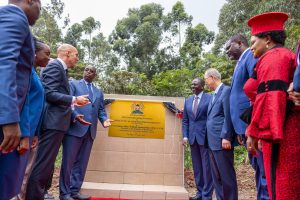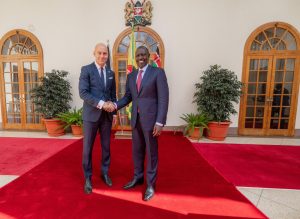Investigations
EXPOSED: Dutch Firm Linked to UoN Chancellor Awarded Tax Waivers and Immunity in Kenya Now Embroiled in Donor Fraud Scandal in Netherlands
The six-month NOS investigation, which involved interviews with over 70 stakeholders and examination of hundreds of internal documents, paints a damning picture of an organization built on inflated claims and fabricated achievements.
Published
8 hours agoon
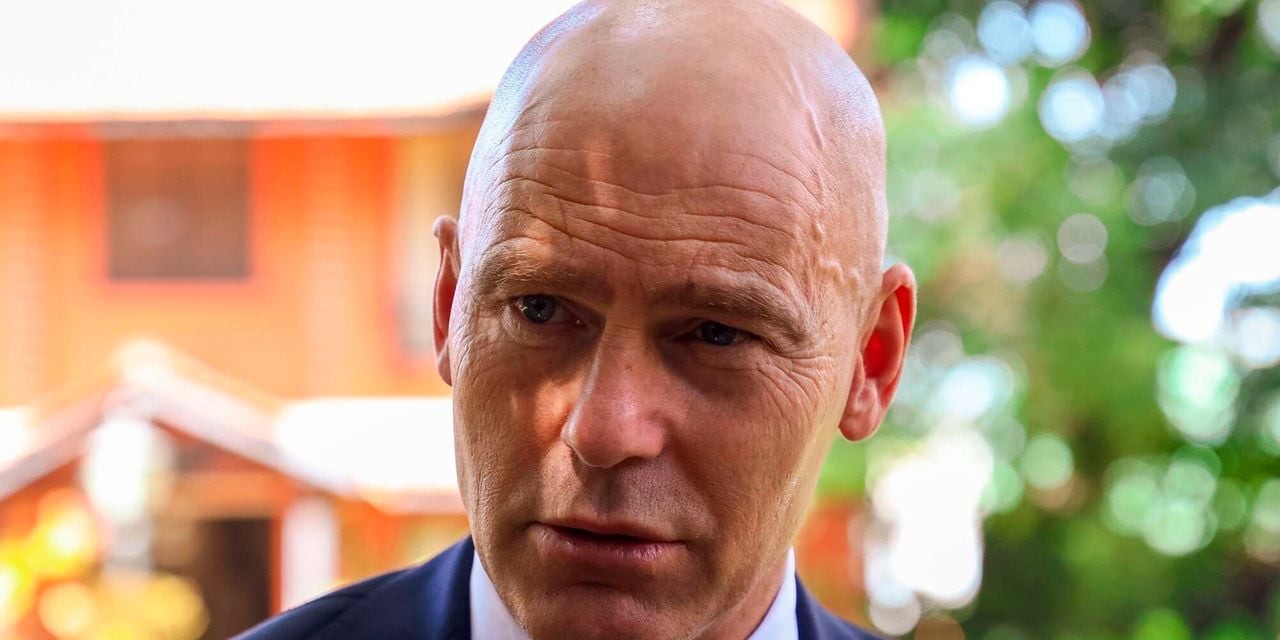
Patrick Verkooijen’s Climate NGO Under Fire as Damning Dutch Investigation Reveals Years of Deception While Kenya Grants Untouchable Status
NAIROBI, Kenya – A bombshell investigation by Dutch public broadcaster NOS has exposed the Global Center on Adaptation (GCA), the same organization granted sweeping diplomatic immunity and massive tax exemptions by President William Ruto’s government, as a fraud-riddled entity that systematically misled international donors by exaggerating its impact and falsely claiming credit for projects it never executed.
The revelations, coming just months after Kenya’s Parliament rubber-stamped unprecedented privileges for the Dutch firm in a deal orchestrated at the highest levels of government, raise urgent questions about why a climate organization now accused of donor deception in its home country needs protection from prosecution, audit, and legal scrutiny in Kenya.
At the center of the scandal is Professor Patrick Verkooijen, the Dutch national who serves simultaneously as GCA’s President and CEO and as Chancellor of the University of Nairobi, a dual role that increasingly appears designed to provide political cover for an organization fleeing accountability in Europe by establishing an untouchable base in Africa.
The Dutch Exposé: A Pattern of Deception
The six-month NOS investigation, which involved interviews with over 70 stakeholders and examination of hundreds of internal documents, paints a damning picture of an organization built on inflated claims and fabricated achievements.
According to the investigation published this week, GCA claimed to have mobilized $25 billion in climate adaptation investments and improved the lives of 82.5 million people across Africa, while creating 900,000 jobs. These extraordinary claims, used to justify continued donor funding, were achieved on an annual budget of just €22 million (approximately Sh3.4 billion).
Climate finance experts told NOS the mathematics simply doesn’t add up.
“These figures are greatly exaggerated,” Dr. Pieter Pauw, a climate finance researcher at TU Eindhoven, told the Dutch broadcaster. “The GCA shows off other people’s feathers. I’ve never seen results beaten up like this.”
The investigation found that GCA routinely claimed credit for massive infrastructure projects funded entirely by the African Development Bank and World Bank, in which the organization played only minimal advisory roles, sometimes contributing as little as a few thousand euros to multi-million dollar initiatives.
The Congo Deception: A $100 Million Lie
Perhaps most damaging is GCA’s documented false claim regarding a World Bank project in the Democratic Republic of Congo worth $100 million. On its website, GCA asserted it had written an action plan for the land erosion project and “influenced” the entire investment.
When NOS journalists examined World Bank documents, there was no mention of GCA’s involvement. The World Bank, asked twice by NOS, confirmed definitively that GCA was not part of the Congolese project.
Yet GCA maintains the lie. When confronted, the organization provided an email from a World Bank employee as “proof” of involvement. NOS contacted the employee directly. She confirmed that while GCA works on similar projects in the same region and occasionally consults with the World Bank, the organization was categorically not part of the Congo project and had no influence on the $100 million investment.
The pattern extends far beyond Congo. NOS identified at least 16 World Bank projects that GCA claims as partnerships on its website and in donor reports. In underlying World Bank documentation, none of these collaborations appear. When pressed by NOS, the World Bank confirmed GCA’s involvement in only five projects and declined to comment on the remaining 11.
Pressure Cooker: Former Staff Speak Out
More than 20 former GCA employees spoke to NOS on condition of anonymity, describing a toxic workplace culture where executives, including Verkooijen, exerted relentless pressure to inflate results to attract donor money.
“If I’m being very honest, that was the reason I left the GCA,” one former employee told NOS. “I had big problems with that.”
Multiple staff members described being instructed to attribute to GCA projects and investments that the organization had minimal or no actual involvement in, transforming advisory memos and brief consultations into claims of project leadership and multi-million dollar impact.
When confronted with these allegations, GCA issued a carefully worded statement acknowledging “confusion” about its results and claiming to have adjusted communications “to avoid misunderstandings.” However, NOS found only minor changes in subsequent annual reports, with the fundamental pattern of exaggeration continuing unabated.
Donors Lose Faith: Gates Foundation, Norway, Denmark Raise Alarms
The NOS investigation reveals that major donors have harbored serious doubts about GCA’s credibility for years, yet continued funding the organization despite mounting evidence of deception.
An internal advisory report to the Gates Foundation, one of GCA’s largest private donors, obtained by NOS, is scathing in its assessment: “GCA is a difficult organization to work with. The center sometimes exaggerates its own role by honoring projects it has not started or supported.”
Norway went further, actually suspending funding to GCA in an attempt to force greater transparency and accountability. The Danish Ministry of Foreign Affairs wrote in internal documents: “It is difficult to estimate what is attributable to the work of the GCA. It is also in the interest of the GCA to have an independent party assess the claims on results.”
GCA did commission an external evaluation, but even that independent assessment concluded the organization too easily attributes results to itself that belong to other actors.
Norway ultimately resumed funding but is now conducting a comprehensive evaluation to determine whether to continue the relationship. In a particularly revealing moment, Verkooijen told NOS last week that both Norway and Denmark would increase their support for GCA. Both countries immediately denied this claim, another example of the organization’s pattern of making statements unsupported by reality.
The Netherlands Pulls the Plug
Most tellingly, GCA’s home country is abandoning the organization. The Dutch government announced in recent weeks it will cease funding GCA, with the Netherlands and United Kingdom both “turning off the money tap,” as NOS reported.
The Dutch Ministry of Foreign Affairs offered a diplomatic explanation, claiming subsidized projects were simply ending. But the timing, coming amid the fraud investigation and years of donor complaints, tells a different story. The Netherlands, which helped found GCA and initially championed it as a flagship climate initiative, no longer trusts the organization operating out of Rotterdam.
Enter Kenya: A Sweetheart Deal Shrouded in Secrecy
While Europe loses faith in GCA, Kenya has rolled out the red carpet, granting the organization privileges that exceed those of many diplomatic missions and creating a virtually untouchable sanctuary in Nairobi.
The timeline is remarkable for its speed and suspicious for its opacity.
In December 2023, GCA donated €1.2 million (approximately Sh186 million) to the University of Nairobi for climate research partnerships. Just weeks later, in January 2024, President Ruto appointed Patrick Verkooijen, the man who authorized that donation, as Chancellor of the University of Nairobi, making him the institution’s first non-African chancellor.
The appointment raised eyebrows in academic circles, but the real maneuvering was happening behind closed doors.
By July 2025, Ruto and Verkooijen presided over a groundbreaking ceremony for GCA’s new “African headquarters” in Nairobi. The organization, facing funding cuts and credibility collapse in Europe, was repositioning to Africa, where oversight would be minimal and accountability optional.
Legal Notice 82: Immunity from the Law
On May 2, 2025, with no public debate and minimal parliamentary scrutiny, Kenya published Legal Notice No. 82 of 2025 under the Privileges and Immunities Act, granting GCA extraordinary protections that go far beyond typical NGO status.
The National Assembly Committee on Environment, Forestry and Mining, in a report tabled in Parliament, approved the following privileges for GCA:
Organizational Immunities:
- Immunity from legal suit and legal process
- Exemption from rates and taxes on importation of goods
- Exemption from taxes on goods and services for official use
- Exemption from import and export restrictions
- Protection from government audits and investigations
Staff Privileges:
- Immunity from prosecution for acts performed in official capacity
- Tax exemption on salaries and emoluments
- Exemption from national service obligations
- Immunity from immigration restrictions and alien registration
- Diplomatic facilities for staff, spouses, dependents, and relatives
- Tax and duty exemptions on personal property and household goods
These privileges, typically reserved for diplomatic missions representing sovereign nations, are unprecedented for a private NGO. They effectively place GCA above Kenyan law.
The committee’s report, sanitized and procedural, makes no mention of the donor fraud allegations, the concerns raised by European governments, or the organization’s documented pattern of deception. It simply notes that GCA has worked with Kenya since 2021 and will inject €3 million (Sh452 million) into food security and infrastructure programs.
The University of Nairobi Connection: Conflict of Interest or Corruption?
Verkooijen’s dual role as GCA chief and University of Nairobi Chancellor creates a textbook conflict of interest that would trigger ethics investigations in most developed countries.
The University of Nairobi, a public institution, is now financially linked to an organization led by its own chancellor. GCA’s Nairobi headquarters will reportedly house offices for Kenya’s Ministry of Environment, meaning the ministry responsible for regulating environmental partnerships will operate from inside the offices of an environmental NGO, blurring lines between regulator and regulated.
Critics argue Verkooijen’s chancellorship was never about academic leadership but about providing political legitimacy and high-level access for GCA’s African expansion, particularly as the organization’s reputation crumbled in Europe.
“This appointment gave Verkooijen direct access to State House and legitimized GCA in East African political circles,” one Nairobi-based governance analyst told The Standard on condition of anonymity. “It’s a classic case of purchasing influence through institutional capture.”
Why Does a Climate NGO Need Diplomatic Immunity?
The central question that Ruto’s government has failed to answer is simple: Why does a climate adaptation organization require immunity from prosecution and protection from legal process?
Legitimate NGOs operate transparently within the legal frameworks of their host countries. They welcome audits, respond to legal challenges, and operate under the assumption that their work will withstand scrutiny.
Diplomatic immunity exists to protect sovereign states and their representatives from legal harassment that could interfere with international relations. Extending such immunity to a private organization, particularly one now facing fraud allegations in its home country, is extraordinary and demands explanation.
The answer, critics suggest, lies in creating a regulatory black hole where GCA can operate with impunity, beyond the reach of Kenyan authorities, the media, or civil society watchdogs.
“They’re creating a parallel structure where GCA can claim to mobilize billions in climate finance, sign agreements with African governments, and channel international donor money, all while being legally untouchable,” says John Githongo, former anti-corruption czar and governance expert. “It’s a recipe for massive corruption.”
The Ministry of Environment Captured
Perhaps most troubling is the plan to house Kenya’s Ministry of Environment inside GCA’s new headquarters. This arrangement, barely mentioned in public discussions, represents a complete collapse of regulatory independence.
The Ministry of Environment is responsible for climate policy, environmental regulations, and oversight of climate finance flowing into Kenya. Housing the ministry inside the offices of a climate NGO that will be seeking government approvals and channeling donor funds creates an
untenable situation where the regulator is literally embedded within the regulated entity.
“This is like housing the Central Bank inside a commercial bank’s headquarters,” one environmental policy expert told The Standard. “The structural conflict of interest is so obvious it’s almost insulting that they think we won’t notice.”
The Money Trail: Who Benefits?
While GCA claims it will invest €3 million in Kenya, the financial arrangements remain opaque. What projects will this fund? How will funds be disbursed? Who will oversee implementation? Will any of this money flow through University of Nairobi, where Verkooijen serves as Chancellor?
The Parliamentary report notes that Kenya will lose tax revenue through the exemptions but claims this will be “recouped through investments.” This is classic development speak for “trust us,” with no concrete metrics or accountability mechanisms.
Given GCA’s documented pattern in Europe of claiming credit for other organizations’ investments, there is every reason to believe the €3 million could be leveraged into claims of “mobilizing” hundreds of millions in climate finance, with GCA taking credit for any and all climate-related spending in Kenya, regardless of actual involvement.
Ruto’s Climate Hypocrisy
President Ruto has positioned himself as a champion of African climate action, hosting the Africa Climate Summit in Nairobi in 2023 and regularly speaking at international forums about climate finance and adaptation.
Yet this GCA deal reveals a troubling pattern where climate rhetoric provides cover for arrangements that benefit connected elites while escaping public scrutiny.
The speed with which the GCA immunity deal moved through Parliament, the lack of public debate, and the timing relative to Verkooijen’s University of Nairobi appointment all suggest a pre-arranged package negotiated at the highest levels, then rubber-stamped through compliant institutions.
Environment Cabinet Secretary Deborah Barasa told the Parliamentary committee that hosting GCA would position Kenya “as a leader in environmental governance” and “a continental hub for finance and resilience-building.”
This language is revealing. Kenya is not becoming a leader in environmental governance; it’s becoming a safe harbor for a European organization fleeing accountability in its home jurisdiction.
What Happens Next?
The NOS investigation has created a credibility crisis for GCA that the organization cannot simply ignore. Major donors are reevaluating their relationships, and the Dutch government’s withdrawal sends a clear signal about the organization’s reputation in informed circles.
Yet in Kenya, GCA now enjoys protections that make accountability nearly impossible. The organization cannot be sued by communities affected by failed projects. It cannot be audited by Kenyan authorities. Its staff cannot be prosecuted for misconduct. Its offices cannot be searched or investigated.
This immunity was granted by a Parliament that appears to have done zero due diligence on GCA’s background, accepted the government’s assurances at face value, and asked no hard questions about why such extraordinary privileges were necessary.
Civil society organizations and investigative journalists will now attempt to scrutinize GCA’s operations in Kenya, but the legal framework created by Legal Notice 82 makes this extraordinarily difficult. Freedom of information requests can be stonewalled. Whistleblowers inside GCA risk prosecution under immunities protecting staff. Financial flows are shielded from public audits.
The Broader Pattern: Kenya as a Safe Haven
The GCA deal fits a broader pattern in Ruto’s administration of granting special privileges to foreign entities with questionable backgrounds in exchange for promised investments that rarely materialize as advertised.
From the Adani Group’s controversial deals in Kenya’s energy and aviation sectors to various “special economic zones” with opaque governance structures, the administration has shown a willingness to suspend normal regulatory oversight and grant extraordinary privileges to foreign investors and organizations, often with minimal transparency about the terms.
In each case, grand promises are made about job creation, foreign exchange earnings, and economic transformation. In each case, Kenyan institutions are subordinated to foreign entities through special legal arrangements that place those entities above the law.
The GCA arrangement may be the most brazen yet: a European organization facing fraud investigations in its home country is granted diplomatic-style immunity in Kenya by a government whose president appointed the organization’s CEO as chancellor of the country’s flagship university, which the organization funds.
Conclusion: Questions Demanding Answers
President Ruto, Deputy President Kithure Kindiki, Cabinet Secretary Deborah Barasa, and the Members of Parliament who approved this arrangement owe Kenyans clear answers to the following questions:
- Were you aware of the donor fraud allegations against GCA when you granted immunity?
- Why does a climate NGO require diplomatic-style immunity from prosecution and audit?
- What due diligence was conducted on GCA before granting these privileges?
- Why was Patrick Verkooijen appointed University of Nairobi Chancellor just weeks after his organization donated money to the university?
- How do you justify housing the Ministry of Environment inside GCA’s headquarters?
- What oversight mechanisms exist to ensure GCA doesn’t replicate in Kenya the pattern of exaggeration and false claims documented in Europe?
- Can you guarantee that GCA will not claim credit for Kenyan government and World Bank projects it has no actual involvement in, as it did in Congo?
- Why was there no public debate before granting these extraordinary privileges?
Until these questions are answered, Kenyans must assume the worst: that their government has granted sanctuary to a discredited European organization in exchange for benefits flowing to a small circle of connected individuals, while exposing the country to reputational damage and potential misuse of climate finance meant to help vulnerable communities adapt to climate change.
The NOS investigation has done Kenyans a service by exposing who we’re really dealing with. Now it’s up to Parliament, civil society, and the media to demand accountability before it’s too late.
Kenya Insights allows guest blogging, if you want to be published on Kenya’s most authoritative and accurate blog, have an expose, news TIPS, story angles, human interest stories, drop us an email on [email protected] or via Telegram
📩 Got a Tip, Story, or Inquiry? We’re always listening. Whether you have a news tip, press release, advertising inquiry, or you’re interested in sponsored content, reach out to us! 📬 Email us at: [email protected] Your story could be the next big headline.

You may like

Yahoo Finance Ranks President Ruto Among World’s Richest Leaders Alongside Putin and Trump

The Nightmare of ‘Lipa Pole Pole’: Inside Kenya’s Predatory Lending Trap

Four Arrested In JKIA Cocaine Cartel Crackdown

From Power’s Shadow to Ruto’s Ally: The Unfolding Political Journey of Gideon Moi

Safaricom’s Ethiopian Humbling: The Telecoms Giant That Built an Empire on Rigging the Game Now Faces Real Competition

Concerns of Voter Apathy As IEBC Registers Only 20,000 Against 6 Million New Voters Target In Second Week

Political Doyen? Insider Details Emerge As Ruto Lands in Moi’s Kabarak Home in Pomp

GREED OR IGNORANCE? HOW MUGITHI KING THREW AWAY SH6 MILLION PAYDAY FOR ONE NIGHT IN GERMANY

EXPOSED: Dutch Firm Linked to UoN Chancellor Awarded Tax Waivers and Immunity in Kenya Now Embroiled in Donor Fraud Scandal in Netherlands

Oburu Odinga Clarifies Raila’s Health Status, Says Brother Recuperating in India

How Bishop Mark Kariuki’s Deliverance Church Became Vehicle for Sh10 Billion Land Fraud

A Pattern Emerges: How Somali-Led Cartels Are Fueling Kenya’s Real Estate Boom With American Fraud Money

Calls Mount To Investigate EADB Over Alleged Massive Corruption and Cartelism As EALA Says The Bank No Longer Serves Its Purpose In The Region

iPhone, iPad, iMac: What The ‘i’ in Apple Products Actually Stands For

Former Nairobi CEC Newton Munene Found Dead as Sonko Alleges Cartel Involvement

Alarm Over Scheduled Sh230 Million Payout To Two Select Firms Putting Sakaja’s ‘Golden Girl’ Asha Abdi On The Spot

US Charges Kenyan with Stealing Sh83 Billion from USAID-Funded Project at KEMSA

Lea Maize Flour Producer Admits to Adding Chemicals to Make Ugali ‘Balloon’ as Experts Issue Warnings

Financial Watchdog Flags Sh600 Million Sham SHA Payments

Gachagua, Woman Face Eviction Over Unpaid Sh25 Million Nairobi Apartment
Most Popular
-
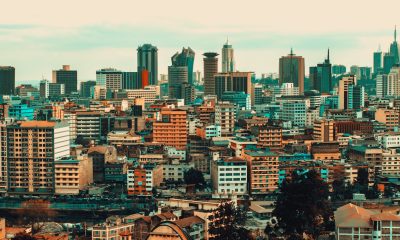
 Investigations1 week ago
Investigations1 week agoA Pattern Emerges: How Somali-Led Cartels Are Fueling Kenya’s Real Estate Boom With American Fraud Money
-
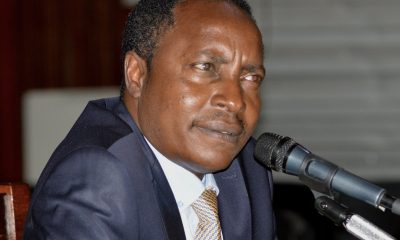
 News8 hours ago
News8 hours agoFormer Nairobi CEC Newton Munene Found Dead as Sonko Alleges Cartel Involvement
-
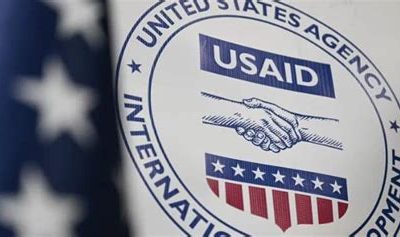
 News1 week ago
News1 week agoUS Charges Kenyan with Stealing Sh83 Billion from USAID-Funded Project at KEMSA
-

 Business1 week ago
Business1 week agoLea Maize Flour Producer Admits to Adding Chemicals to Make Ugali ‘Balloon’ as Experts Issue Warnings
-

 Investigations5 days ago
Investigations5 days agoFinancial Watchdog Flags Sh600 Million Sham SHA Payments
-

 News1 week ago
News1 week agoGachagua, Woman Face Eviction Over Unpaid Sh25 Million Nairobi Apartment
-

 Grapevine1 week ago
Grapevine1 week agoGovernor Mutula Kilonzo Embroiled in Dramatic Fallout With Baby Mama
-
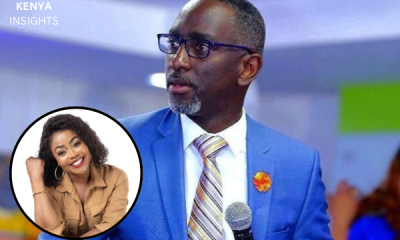
 Grapevine6 days ago
Grapevine6 days agoRobert Burale’s Ex-Wife Spills All The Tea – “I Found Gay Porn on His Laptop, Another Woman Paid For Our Honeymoon!
